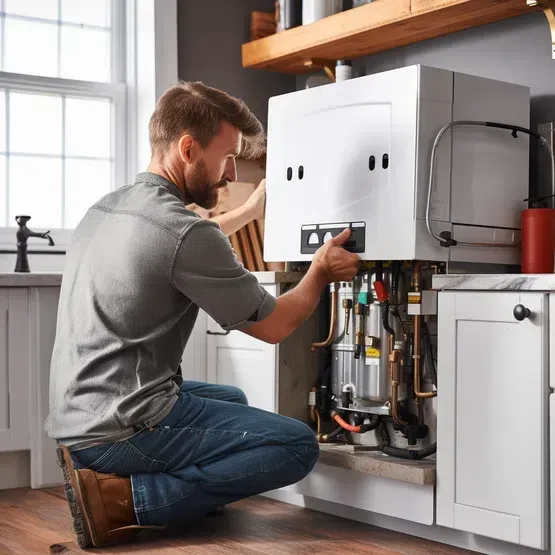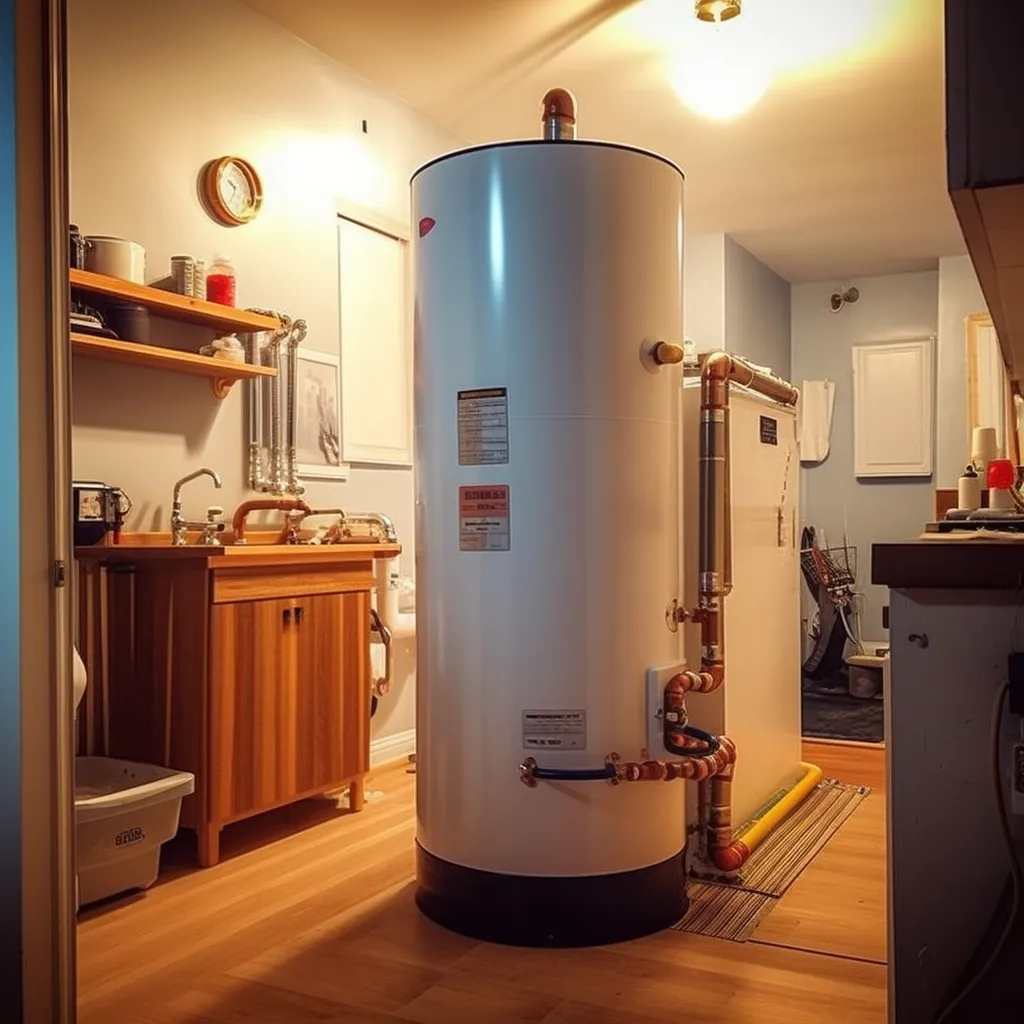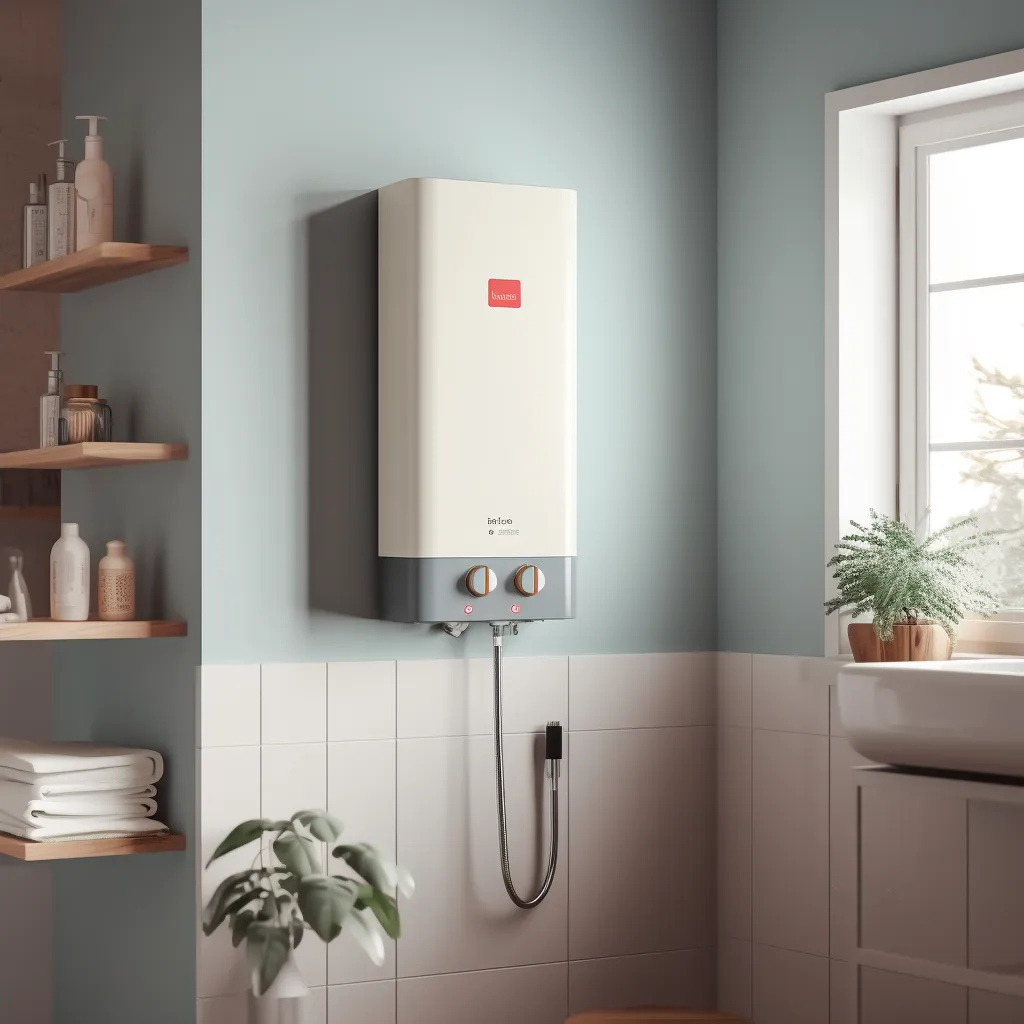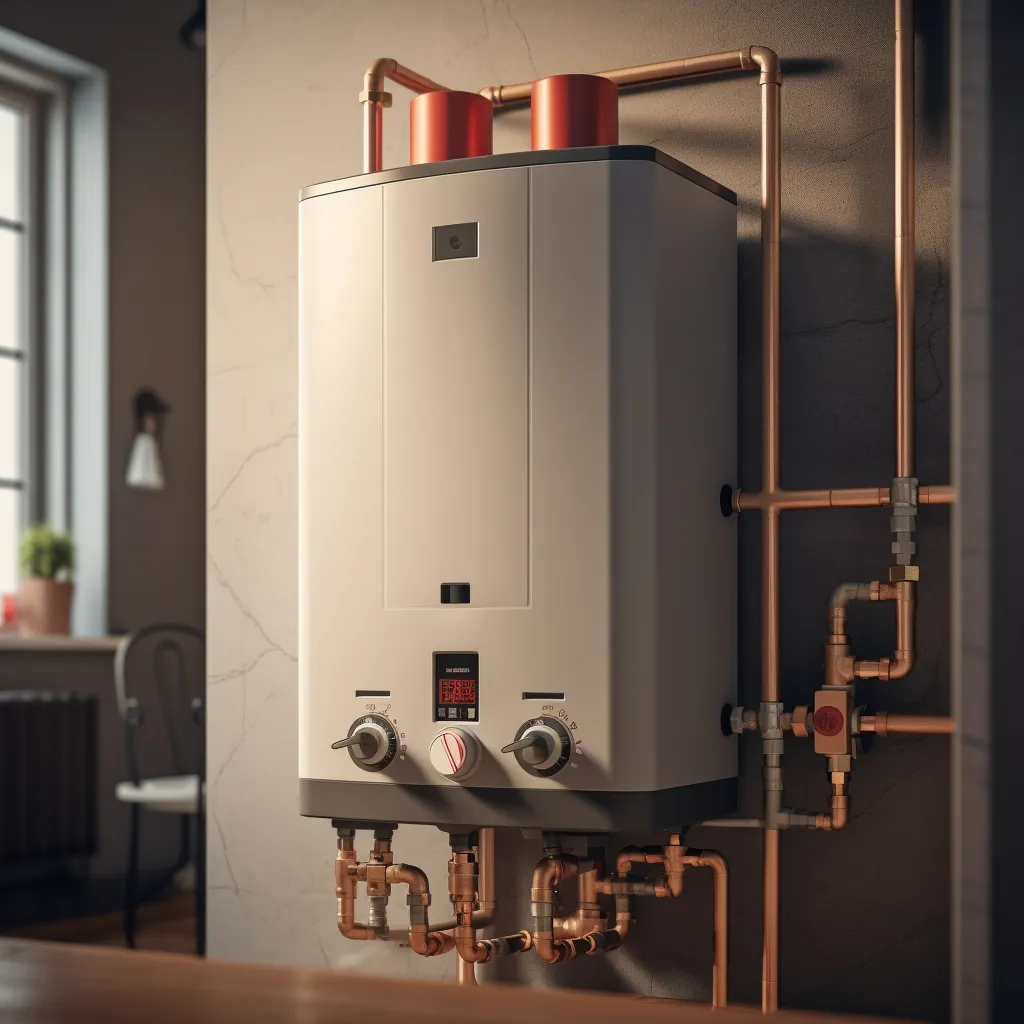Types of Water Heaters: Which One is Best for Your San Mateo Home?
Selecting a new water heater can indeed feel overwhelming due to the array of options available, ranging from traditional tanks to solar units and tankless models. Each type offers varying levels of energy efficiency and hot water capacity. To aid you in making an informed decision that caters to your family's needs, our comprehensive guide provides an in-depth review of each water heater type. By delving deeper into the guide, you'll be equipped to make the right choice. Remember to carefully consider the unique advantages and disadvantages of each type before finalizing your decision, ensuring that your chosen water heater perfectly aligns with your requirements and preferences.

Traditional Storage Tank Water Heaters
Tank-style water heaters are a popular choice for efficiently heating and storing water in insulated tanks. They utilize gas, electric, or oil as an energy source to heat the water. These units offer the advantage of providing a continuous supply of hot water, making it readily available whenever you need it with just a simple turn of the tap. Their reliability and ease of use make them a practical option for many households seeking a consistent and dependable hot water solution.
Pros:
Lower cost: Tank-style water heaters are generally more budget-friendly upfront compared to other types of water heaters, making them an appealing option for cost-conscious homeowners.
Longer warranty periods: Many tank-style water heaters come with extended warranty periods, providing added protection and peace of mind for a longer duration.
Ease of maintenance: Maintenance for tank-style water heaters is usually straightforward and doesn't involve complex procedures, making it easier for homeowners to keep their units in good working condition.
Cons:
High operating expenses: Traditional water heaters are known for their lower energy efficiency, resulting in higher operating expenses over time due to increased energy consumption.
Limited capacity: The size of the tank determines the amount of hot water available, which can lead to a shortage during peak usage periods or if multiple hot water demands occur simultaneously.
Risk of water damage: There is a risk of water damage if the tank develops a leak or fails, potentially causing significant damage to the surrounding area and requiring immediate attention and repair. Regular maintenance and inspections are essential to minimize this risk.


Tankless Water Heaters
Tankless water heaters indeed offer a modern and efficient alternative to traditional water heaters. Unlike tank-style models that continuously store and heat water, tankless units heat water on demand. This approach not only saves energy but also frees up valuable space in your home, as there is no need for a bulky storage tank.
While the upfront cost of a tankless water heater may be higher compared to traditional models, the long-term savings on utility bills compensate for it. Thanks to their energy-saving benefits, tankless water heaters provide a more eco-friendly and cost-effective solution for meeting your hot water needs. Their efficiency and on-demand heating ensure you only use energy when necessary, contributing to reduced energy consumption and lower utility expenses over time. For homeowners seeking a greener and economically sound water heating solution, tankless water heaters stand as a practical and environmentally conscious choice.
Pros:
Easy installation: The compact design of tankless water heaters simplifies the installation process, making it more straightforward compared to traditional tank-style units.
High energy efficiency: Tankless water heaters boast excellent energy-saving capabilities, resulting in consistently low monthly utility bills and reduced energy consumption.
Continuous hot water supply: With tankless water heaters, you'll never run out of hot water as they provide an uninterrupted supply on demand, ensuring hot water is readily available whenever needed.
Longer lifespan: Tankless water heaters typically have a longer life expectancy compared to traditional water heaters, making them a smart and economical investment in the long run. Their durability ensures they will serve you efficiently for many years to come.
Cons:
Higher initial cost compared to traditional water heaters: While tankless water heaters offer long-term savings, their upfront cost can be higher than traditional water heaters, which may be a consideration for budget-conscious homeowners.
Venting complexities in small spaces: Installing tankless water heaters in small or confined spaces can present venting challenges, requiring careful planning and professional expertise to ensure proper ventilation.
Limited capacity for high-demand applications: Although tankless water heaters provide continuous hot water, their capacity may be limited when multiple high-demand applications are running simultaneously. In such cases, it's essential to consider the unit's flow rate and ensure it meets your household's hot water requirements during peak usage times.
Heat Pump Water Heaters
Heat pump water heaters are indeed renowned for their exceptional efficiency and cost-effectiveness in heating water. By utilizing a small compressor to extract heat from the air, they offer an energy-efficient solution for hot water needs. Their ability to provide hot water without consuming a substantial amount of energy leads to significant cost savings for homeowners.
One of the best features of heat pump water heaters is their operation without electricity, making them a reliable source of hot water even during power outages. This advantage ensures continuous access to hot water, regardless of any electrical disruptions.
With a heat pump water heater, you can enjoy the benefits of efficient and affordable hot water, making it a practical and environmentally friendly choice for your home.
Pros:
Energy efficiency: Heat pump water heaters are exceptionally energy efficient, leading to reduced utility bills compared to traditional water heaters. Their ability to extract heat from the air efficiently ensures optimal energy utilization.
Renewable energy utilization: These water heaters are environmentally friendly as they harness renewable energy from the air to heat the water. This sustainable approach contributes to reducing carbon emissions and promoting greener living.
Continuous hot water during power outages: One of the advantages of heat pump water heaters is their ability to provide hot water even during power outages. Since they operate without relying solely on electricity, you can continue to enjoy a steady supply of hot water when other power-dependent systems might be affected.
Cons:
Higher initial cost: It's true that heat pump water heaters typically have a higher upfront cost compared to traditional water heaters. However, the long-term energy savings can offset the initial investment over time.
Ventilation and space requirements: Heat pump water heaters may require more ventilation and space for installation due to their heat exchange process. Ensuring proper ventilation and adequate space is essential to ensure optimal performance.
Limited capacity: Heat pump water heaters may have a limited capacity for heating water, resulting in a lower availability of hot water per usage compared to some traditional water heaters with larger storage tanks. It's essential to consider your household's hot water demands and select a unit that meets your needs accordingly.


Heat Pump Hybrid Water Heaters
Heat pump hybrid water heaters indeed offer a compelling blend of advantages from both conventional storage tank water heaters and heat pump systems. These units deliver high efficiency and lower operating costs compared to traditional models, providing significant energy savings over time. Despite their higher initial investment, the superior functionality and effectiveness of heat pump hybrid water heaters make them a worthwhile and cost-effective choice for homeowners seeking an energy-efficient water heating solution. With their ability to combine the best features of two popular technologies, these hybrid water heaters stand as an excellent option for those looking to optimize efficiency and enjoy long-term savings on their utility bills.
Pros:
Increased energy efficiency: These water heaters boast high energy efficiency, resulting in reduced utility bills over time compared to traditional storage tank heaters.
Renewable energy utilization for sustainability: Heat pump hybrid water heaters harness renewable energy from the air, contributing to a more sustainable and environmentally friendly water heating solution.
Hot water availability during power outages: Even during power outages, heat pump hybrid water heaters can still provide hot water, ensuring continuous comfort and convenience for your household.
Longer lifespan: Heat pump hybrid water heaters generally have a longer lifespan compared to traditional storage tank heaters, providing a more durable and reliable water heating solution for your home.
Cons:
Higher initial cost compared to conventional storage water heaters.
Potential ventilation and space requirements for installation.
Limited capacity, providing a finite amount of hot water per use.
Risk of water damage if the tank fails or leaks.
Solar Powered Water Heaters
Solar-powered water heaters present an excellent opportunity to reduce monthly utility bills and utilize renewable energy. There are two main types available: active and passive systems. Both types harness the sun's energy to heat stored water, offering a straightforward and cost-effective way to save money. By choosing a solar-powered water heater, you can enjoy the advantages of lower energy costs while embracing a more sustainable and environmentally friendly approach to heating water. It's a win-win situation for your wallet and the planet.

Active Systems:
Active solar-powered water heaters operate using pumps to transfer hot fluid from the collectors to a storage tank for future use. These systems are highly efficient and capable of generating significant amounts of hot water. By utilizing active systems, you can optimize the collection of solar energy and ensure an ample supply of hot water to meet your household needs. These systems are a smart choice for maximizing the benefits of solar energy and enjoying a reliable and eco-friendly hot water solution.
Passive Systems:
Passive solar water heaters operate by utilizing natural convection to transport heated fluid from the collectors to a storage tank, effectively harnessing solar power to heat the water. These systems are distinguished by their low installation and maintenance costs. While they may not produce as much hot water as active systems, passive solar water heaters offer a cost-effective and environmentally friendly solution for utilizing solar energy to meet your hot water needs. They stand as a practical choice for those seeking a budget-friendly and sustainable approach to heating water with the power of the sun.
Pros:
High efficiency, leading to significant cost savings on energy bills over time.
Utilization of renewable energy from the sun, making them an environmentally friendly option.
Longer lifespan compared to traditional water heaters, providing a durable and reliable water heating solution for your home.
Cons:
Higher initial cost compared to traditional storage tank heaters.
Additional space and equipment requirements may complicate installation.
Risk of water damage if solar panels become faulty or damaged, requiring regular maintenance and inspections to ensure their proper functioning.


Point-of-Use Water Heaters
Point-of-use water heaters are an excellent solution for those who desire hot water on demand in a compact and efficient system. Ideal for small spaces or as an alternative to traditional storage tanks, they offer convenience while avoiding associated costs and inefficiencies. By providing hot water directly at the point of use, these heaters eliminate the need for long pipe runs and minimize heat loss, resulting in energy savings and enhanced efficiency. With their space-saving design and instantaneous hot water delivery, point-of-use water heaters offer a practical and effective solution for meeting your hot water needs with ease and convenience.
Pros:
High energy efficiency, leading to lower monthly utility expenses and reduced energy consumption over time.
Compact size, enabling easy installation and maintenance in small spaces where larger storage tank heaters may not be practical.
Longer lifespan compared to storage tank heaters, providing a more durable and reliable water heating solution for your home. The extended lifespan ensures lasting performance and value for your investment.
Cons:
Higher initial cost and potential need for extra ventilation and installation space compared to traditional water heaters.
Lower hot water capacity in tankless heaters, resulting in limited availability per use when multiple high-demand applications are running simultaneously.
Higher risk of water damage due to tank failure or leaks in tankless heaters, necessitating regular maintenance and inspections to mitigate potential risks.
Water Heaters With Hydronic Boilers
Hydronic boilers are a remarkably efficient heating system that uses water, rather than air, to circulate heat throughout your space. Their versatility allows them to provide both hot water for domestic use and space heating, making them particularly suitable for colder climates. Moreover, hydronic boilers can be paired with tank water heaters to offer a more cost-effective solution for meeting your hot water needs. With their exceptional heating capabilities and potential for energy savings, hydronic boilers stand as a practical and comprehensive heating solution for your home.

Pros:
High efficiency, resulting in reduced monthly utility bills and significant energy savings over time.
Versatility to provide both space heating and domestic hot water, offering a comprehensive solution for your heating needs.
Compact design for easy installation in tight spaces, making them suitable for various home layouts and space constraints.
Longer life expectancy compared to traditional tank water heaters, providing a more durable and reliable heating system for your home. The extended lifespan ensures a lasting and cost-effective heating solution.
Cons:
Higher initial cost compared to traditional storage models, which may require a larger upfront investment.
Limited capacity, leading to a finite amount of hot water available per use, especially during peak demand times.
Possibility of noise generation during operation, which may be a consideration for those seeking a quieter heating system.
Potential ineligibility for certain utility rebates or incentives that might be specific to other types of water heating systems.


Smart Water Heaters
Upgrade your water heating system with smart water heaters, the cutting-edge technology for efficient hot water production. Equipped with Wi-Fi enabled thermostats, these innovative heaters allow you to conveniently manage your hot water consumption and expenses from anywhere. Take full control of temperature settings and customize them according to your preferences, all through your smartphone. Embrace the future of water heating with smart technology that offers unparalleled convenience and energy efficiency for your home.
Pros:
Remote control via Wi-Fi enabled thermostat, enabling convenient management of the water heater from smartphones or other devices. This allows users to adjust settings and monitor performance remotely, maximizing convenience and control.
Energy-saving modes, including vacation mode, help reduce monthly energy bills by optimizing energy consumption when hot water demand is low or during extended periods of non-use.
Compact size facilitates easy installation and maintenance, even in tight spaces where traditional storage tank heaters may not fit comfortably. This ensures a practical solution for various home layouts.
Cons:
Higher cost compared to traditional storage water heaters, which may be a consideration for budget-conscious homeowners.
Some utility rebates or incentives may not apply to smart water heaters, limiting potential cost-saving opportunities.
Additional software updates may be required for compatibility with newer devices, requiring periodic maintenance to ensure optimal performance.
Potential security risks if the Wi-Fi connection is not secure, underscoring the importance of safeguarding your smart water heater's connectivity to protect your privacy and data. Regularly updating security measures is essential to mitigate potential risks.

Condensing Water Heaters
Condensing water heaters bring together the benefits of both tankless and conventional storage tank water heaters, creating an innovative and efficient solution. These models utilize advanced technology to extract heat from exhaust gases, optimizing efficiency and leading to significant cost savings. By capturing and utilizing heat that would otherwise be wasted, condensing water heaters deliver superior performance and increased energy efficiency compared to traditional water heaters. Embrace the future of water heating with these innovative units that offer improved performance and environmentally friendly features for your home.
Pros:
High energy efficiency, leading to lower monthly utility bills and significant long-term savings on energy costs.
Longer lifespan compared to traditional tank water heaters, providing a more durable and reliable water heating solution for your home. The extended lifespan ensures lasting comfort and value for your investment.
Hot water availability during power outages, ensuring continuous access to hot water even when other power-dependent systems may be affected. This feature enhances comfort and convenience for your household during unexpected disruptions.
Cons:
Higher initial cost compared to traditional water heaters, which may require a larger upfront investment.
Space and ventilation requirements may be necessary for proper installation, and homeowners should consider these factors to ensure optimal performance.
Limited hot water capacity, particularly during peak usage times, may require careful consideration of household hot water needs.
Risk of water damage in case of tank failure or leakage necessitates regular maintenance and inspections to mitigate potential risks. Proactive measures can help ensure the reliability and longevity of the system.

How to choose the right
water heater for your home
Choosing the right water heater size is crucial to ensure optimal hot water availability without wasteful expenses. A water heater that is too small may lead to insufficient hot water, causing inconvenience and discomfort. On the other hand, an oversized water heater can be costly to operate and take up unnecessary space in your home.
To determine the ideal water heater size for your family's needs, consider your lifestyle and daily hot water usage. Take into account the number of occupants in your household, their hot water needs, and any peak usage periods. By carefully assessing these factors, you can select a water heater size that meets your requirements while providing affordable home comfort with a sufficient and consistent supply of hot water.

When should you
replace your water heater?
A properly functioning water heater plays a crucial role in your home's plumbing system, providing hot water for essential daily tasks like showering, dishwashing, and laundry. Typically, water heaters have a lifespan of around 10-15 years. If your water heater has already reached or exceeded this lifespan, it's wise to start considering the investment in a new one.
Upgrading to a newer water heater model ensures a reliable hot water supply and can help you avoid potential issues and costly repairs associated with an aging unit. By proactively replacing your old water heater, you can enjoy the benefits of improved efficiency and performance, ensuring a steady and consistent supply of hot water for your household needs.
Here are some telltale signs that suggest it may be time to consider replacing your water heater:
Tank leakage.
Strange noises.
Discolored and rusty hot water.
Lack of hot water.
Fluctuations in water temperature.
High energy bills.
The initial cost of installing a new water heater can be significant; however, the long-term benefits of improved energy efficiency and reliable performance make it a worthwhile investment. By consulting a licensed plumber, you can receive a thorough evaluation of your specific needs, along with expert recommendations on the right type and size of water heater for your home. Proper installation ensures optimal efficiency and longevity, allowing you to enjoy the full advantages of your investment for years to come.
Maintenance tips for
water heater efficiency
Regular maintenance of your water heater is essential to prevent issues and maintain its efficiency. By following simple maintenance routines, you can keep your water heater running smoothly and enjoy affordable and reliable hot water.
Benefits of hiring a licensed plumber
to replace your water heater
When contemplating the replacement of your water heater, it may be tempting to undertake the task yourself. However, there are several advantages to hiring a professional plumber that you should consider:

Expertise and experience for accurate and efficient installation.
Proper sizing to ensure optimal performance and energy efficiency.
Compliance with building codes and safety regulations.
Insurance coverage for added protection.
Warranties or guarantees on workmanship.
Time-saving and convenient service.
In summary, enlisting the services of a professional plumber for your water heater replacement ensures a safe, reliable, and hassle-free installation. Their expertise and attention to detail will help maximize the benefits of your new water heater while minimizing potential risks and complications.
Contact Us
GET IN FULL TOUCH
PHONE: (650) 337-0872
EMAIL:
ifran@waterheatersinsanmateo.com
All Pro Plumbing and Rooter
San Mateo, CA 94401
